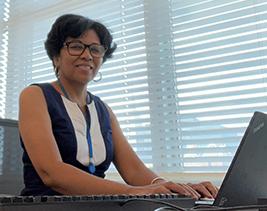Expert Voices
With concerted, ambitious action, we can reduce poverty drastically by 2030

Around the world, some 670 million people live in extreme poverty. Unless progress picks up pace, the international community is nowhere near ending this plight before 2030. Ahead of the International Day for the Eradication of Poverty on 17 October, UN DESA’s Hantamalala Rafalimanana describes the dire situation and what it takes to end poverty once and for all.
Can you provide information on the current state of poverty worldwide?
“The progress in poverty reduction made by the world before 2020 was reversed by the disruptions caused by the COVID-19 pandemic. The slow and uneven recovery from the pandemic, compounded with the effects of the war in Ukraine, is such that poverty remains high at the world level. In 2022, 8.4 per cent of the world’s population – as many as 670 million people – were estimated to still be living in extreme poverty.
Poverty is and will continue to be concentrated in sub-Saharan Africa. While most of the world’s regions are expected to eradicate poverty by 2030, sub-Saharan Africa will probably still have 30 per cent of its population living in extreme poverty in 2030.
The world is not on track to end poverty by 2030. If current trends continue, 7 per cent of the world’s population – roughly 574 million people – will still live in extreme poverty in 2030. However, with ambitious and concerted action towards the most vulnerable, we can reduce poverty drastically by lifting 124 additional million people out of extreme poverty by 2030.
Let us be reminded that poverty is not simply about not having enough money. It is also the condition of struggling to fulfill the most basic needs like food, education, health, water and sanitation, decent work and housing, to name a few. The multidimensional poverty index, which takes these different dimensions into account, shows that even more people live in multidimensional poverty than in monetary poverty – 1.1 billion people, or 18 per cent of the population, in 2023.”
The 2023 SDG Summit recently concluded, with world leaders agreeing to increase their efforts to achieve the Sustainable Development Goals (SDGs). What does the political declaration say about accelerating actions to end poverty? Have any international actors made new commitments to ending poverty?
“The decisive, action-oriented Political Declaration adopted at the SDG Summit emphasized that eradicating poverty in all its forms and dimensions is the greatest global challenge and an indispensable requirement for sustainable development.
World leaders were conscious that without an immediate course correction and acceleration of progress toward achieving the SDGs, our world is destined to face continued poverty, prolonged periods of crisis and growing uncertainty. To this end, the Declaration focuses on the means of implementation, and in particular, on financing for development.
World leaders agreed to take immediate action to unlock more and better financing for developing countries, including by ensuring significant mobilization of resources from a variety of sources to finance sustainable development, and strengthening the capacity to mobilize domestic resources and private sector investment to provide adequate and predictable means for developing countries, in particular least developed countries.
The Declaration also urges immediate action to deliver the SDG Stimulus, launched earlier this year by the UN Secretary-General, which calls for a massive increase in financing for the achievement of the SDGs to the tune of $500 billion each year, primarily by scaling up affordable long-term financing by the multilateral development banks.
Finally, the Declaration conveys strong support from all countries for a much-needed reform of the international financial architecture to better reflect today’s global economy and benefit developing countries better.”
We will be observing the International Day for the Eradication of Poverty on 17 October . Can you tell us about this year's commemoration event and how it will bring attention to the urgent issues faced by people living in poverty?
“People living in extreme poverty are often exploited in the labour market. Most of them work in the informal economy where they are underpaid and face difficult and dangerous conditions without any protection.
For people experiencing persistent poverty, the lack of decent working conditions and adequate social protection creates insecurity. This denies them the ability to take charge of their lives and exposes them to exploitation, humiliation and feelings of futility preventing them from participating fully in their communities. They are denied a life in dignity.
This year’s International Day for the Eradication of Poverty will highlight in practice the intimately linked roles played by “decent work” and “social protection” in eradicating poverty. It will show how we can fulfill the promise of the right to work and a life of dignity enshrined in the Universal Declaration of Human Rights and reaffirmed in the 2030 Agenda for Sustainable Development to end poverty in all its forms everywhere.”
For more information: International Day for the Eradication of Poverty
 Welcome to the United Nations
Welcome to the United Nations